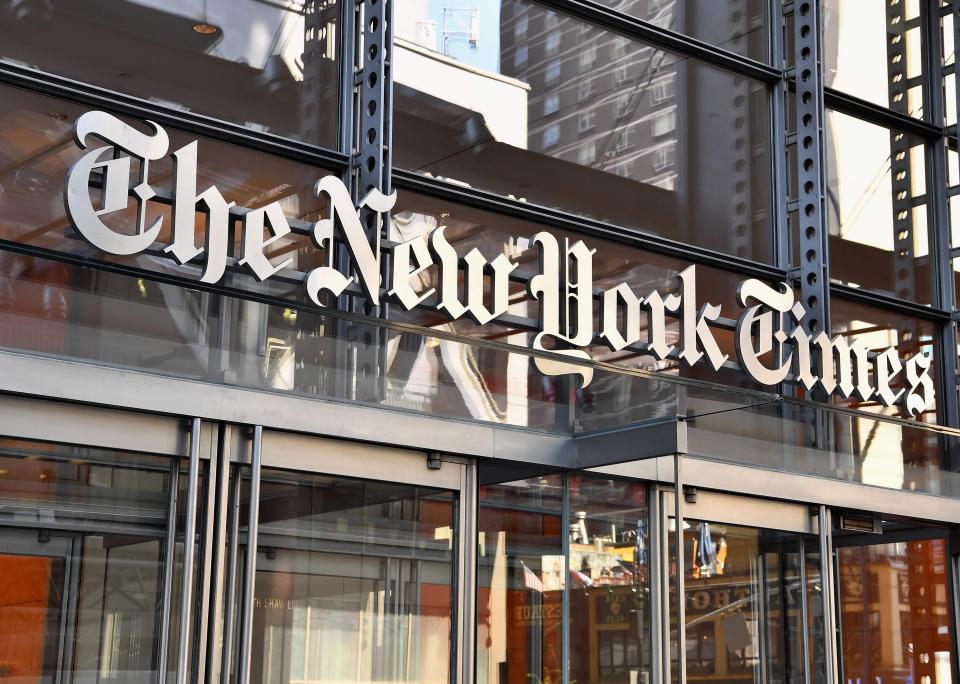Donald Trump's treason claim comes as leaks show Washington is desperate — about him

President Donald Trump says the New York Times has committed “Treason." If anything, the venerable Gray Lady is guilty of a far less capital offense known, in newspaper parlance, as “burying the lead.”
That’s what editors accuse reporters of doing when they put their most interesting stuff wa-a-a-a-ay down in the middle of a story.
It’s arguably what happened over the weekend, when the Times posted a lengthy, detailed story about how the U.S. is escalating efforts to hack into Russian infrastructure as a deterrent against Russian attempts to do the same in the U.S.
Twenty-two paragraphs into the piece comes this jaw-dropper of a sentence:
“Pentagon and intelligence officials described broad hesitation to go into detail with Mr. Trump about operations against Russia for concern over his reaction — and the possibility that he might countermand it or discuss it with foreign officials, as he did in 2017 when he mentioned a sensitive operation in Syria to the Russian foreign minister.”

It’s almost certainly this, and not the meat of the story, that prompted the president’s off-the-wall tweet about treason.
Any intimation that the Times endangered national security by reporting the cyber-campaign was preempted by the paper’s own due diligence. Unlike the president, who blithely blew a foreign ally’s cover in one of his early meetings with Russian officials, responsible news organizations give national security officials a chance to push back before publishing their secrets.
Sometimes, they bow to governmental concerns, sometimes, they don’t; the calculus always involves weighing public safety against the public’s right to know. That’s not treason; it’s the First Amendment in action.
Trump's media target: Donald Trump can use Barack Obama's bad precedent to target 'enemy of the people' media
In this case, the Times reported it was given no indication it shouldn’t publish, a signal that U.S. officials actually want the Russians to know they are in the cybercrosshairs.
If the strategy is deterrence, as it usually is when it comes to America’s old Cold War foe, that make sense. Further corroboration: Trump’s national security adviser, John Bolton, discussed the escalation of the anti-Russian hacking campaign at a public conference last week sponsored by The Wall Street Journal — likely the reason the Times decided to post its story, which clearly had been months in the works.
Trump’s baseless accusation against the Times came during one of his all-too-typical tweet-a-thons. He followed up by rolling out the old “Enemy of the People” chestnut to label his media critics, which would be laughable were it not for the fact that it came on the same weekend Capital Gazette editor Rick Hutzell had a silent, packed ballroom of nearly 2,000 attendees at the Investigative Reporters & Editors conference blinking back tears as he described how his small Annapolis news organization is persevering in the face of last year’s massacre of five colleagues by a deranged gunman.
It is local news organizations like Hutzell’s, which bring you news of your local city council and the school board and the ups and downs of high school sports teams, that are struggling to survive in a digital economy — not the New York Times, which the president once again this weekend described as “failing,” despite ample evidence to the contrary.
Trump, alone with lies: With Sarah Sanders leaving the White House, Trump now lies alone
The president’s reckless rhetoric reveals a stubborn habit psychologists describe as “projection.” His decision last weekend to fire some of his pollsters after their numbers revealed some storm clouds on his political horizon is yet another case in point: Trump describes as “fake” anyone who comes close to home truths about himself.
So the president, sworn to “preserve, protect and defend the Constitution of the United States” — a Constitution that includes First Amendment protection of free speech — might want to think again before bandying about charges of treason against those who speak less than favorably of him.
As someone who has worked my entire professional life in newsrooms, who occasionally has been the recipient of leaked official documents myself, and who knows official sources resort to the press only when all else has failed, I read the 22nd paragraph in the New York Times story as a cry for help.
There’s an air of desperation in the nation’s capital. And it’s not all emanating from the Twitter addict who’s too small to rise above his critics.
Kathy Kiely is the Lee Hills Chair in Free Press Studies at the Missouri School of Journalism. Follow her on Twitter: @kathykiely
You can read diverse opinions from our Board of Contributors and other writers on the Opinion front page, on Twitter @usatodayopinion and in our daily Opinion newsletter. To respond to a column, submit a comment to letters@usatoday.com.
This article originally appeared on USA TODAY: Donald Trump's treason claim comes as leaks show Washington is desperate — about him

